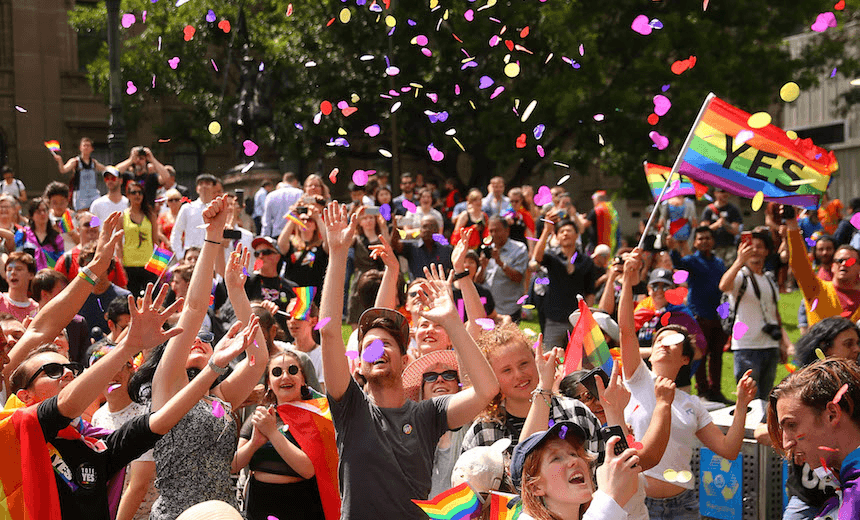While Australia eventually did the right thing, it took months of public attacks on the LGBTQI+ community to get there. Kiwi export Courtney Mayhew reflects on having her sexuality turned into a public political football.
Every year, 7th November is special day. It is the day of my birthday and the birthday of our Lorde. I usually get a little anxious about it, compounded by how many more birthdays I have celebrated than Lorde, and yet how little I have achieved in comparison.
This year it was marked by another type of anxiety, a strange and unnerving addition to my birthday. It was the last day that Australians were able to have their say on marriage equality, in a non-binding postal vote.
As a Kiwi living in Australia I was in the prime position to watch how this country got to marriage equality, with strong opinions but zero ability to have a say. Sometimes I like to revel in the chance to point out the things that we have and they don’t, usually as a deflection when someone asks me to say “chilly bin”. There was no revelling during the referendum. What I experienced was a thoroughly unnecessary process, paved with anger, hurt and frustration.
You could not escape it. I walked down the street one day to see ‘Stop the Fags’ posters, then jumped in a taxi where a man on talkback radio was equating being queer with being a paedophile. I woke up on a sunny Sunday morning to walk out of my house to see ‘Vote No’ written in the sky. Day in, day out, I saw complete strangers have strong opinions on my sexuality. Daily I saw a social post from an otherwise self-assured friend expressing how much of a toll the plebiscite had taken. I randomly burst into tears at otherwise jovial dinners and took many a deep breath when I heard people refer to “them” when speaking on the “issue.” I even got sick of the YES posters, because sometimes I didn’t want to be forced to think about it.
I was constantly made aware of the inequality I personally faced within this country. And as someone who falls somewhere around the ‘B’ in the LGBTQI+, the absurdity of it all took on a particular meaning, perfectly articulated by Australian comedian Kate McCartney, “It seems insane to me that half of me is allowed to get married, when apparently the other half isn’t.”
Defending the rhetoric that this process brought forth, Prime Minister Malcolm Turnbull said: “People will often say, in any democratic debate, they’ll often say things which are hurtful and unfair and sometimes cruel but that is part of a debate.”
Putting a human rights issue that concerns a historically oppressed minority to national debate is unfair. It’s cruel. It gave those who would have otherwise kept their homophobic comments to themselves a voice and a platform which told them it was OK to impress their views on others’ lives. I wholeheartedly believe in the right of others to hold their own views, religious or otherwise. I don’t however believe that anyone in the LGBTQI+ community should have gone through the months of abuse they suffered as a result.
https://youtu.be/kow_m3-xuMs?t=4m19s
I say all of this as a person who is happy with who they are and with incredible support systems in place. So what broke my heart the most, was imagining how it was affecting those more vulnerable, those amidst coming to terms with who they are. Those shouting “no” the loudest consistently cited the effect of marriage equality on children, but showed no care for the young queer kid who still hasn’t found their voice yet, nor the same sex couple families who were experiencing bigotry for the first time. The “no” they advocated was a fear of change, fear of the ‘other’ and showed a complete lack of compassion for the lives it affected.
Make no doubt, the hangover I am suffering from the celebrations is indicative of how happy I am that Australia is finally about to achieve marriage equality. I hope that what comes from this is not only the ability for two people who love each other to get married. Perhaps there also will be some reflection on the part of those who this country entrusted to lead, that sometimes you just have to do the right thing. A valuable lesson that might be applied to Australia’s recognition of indigenous rights and its treatment of refugees.
The Society section is sponsored by AUT. As a contemporary university we’re focused on providing exceptional learning experiences, developing impactful research and forging strong industry partnerships. Start your university journey with us today.
